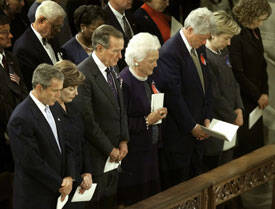An Upside of Dynasty
The United States has been well served by dynasties in both parties throughout its history and continues to be. Note the Romneys, the Dodds and the Kennedys. And consider the Udalls.
In 1880 David King Udall established a Mormon community in St. Johns, Ariz., where the family settled. His son Levi S. Udall propelled the family into public service by becoming Chief Justice of the Arizona Supreme Court. Levi’s two sons, Stewart and Morris, became nationally prominent.
Stewart Udall served in the U.S. House of Representatives (1955-61). In 1960 he campaigned for John F. Kennedy and seved as U.S. secretary of the interior under Presidents Kennedy and Johnson. There Stewart promoted solar energy, justice for miners and a host of environmental laws on air, water, land and endangered species.
Morris Udall, known as Mo, was elected to the U.S. House of Representatives for three decades (1961-91). In 1976 he sought the Democratic presidential nomination, but lost to Jimmy Carter. Morris Udall was an avid environmentalist. He promoted campaign reform and congressional ethics and opposed the tobacco industry, strip mining and, early on, the Vietnam War. As a longtime friend of the conservative Republican Senator Barry Goldwater, Mo Udall embodied Congressional civility.
In 2008, Stewart’s son, Tom Udall (New Mexico, Third District), and Mo’s son Mark Udall (Colorado, Second District) will run for the U.S. Senate. Whether they win or lose, where is the peril to our democracy in such a case? Rather, doesn’t such public service, confirmed by election after election, show an upside of dynasty?
Aid for Kids
Among the proposals floated in President George W. Bush’s recent State of the Union address was an initiative called Pell Grants for Kids. Cleverly named after a popular federal college aid fund, it would grant families with children in failing public schools the funds to pay for tuition in private schools. Not surprisingly, the proposal was greeted with extreme skepticism by opponents, who saw it as nothing more than a voucher program by another name. Many of the private schools that would benefit from the program are, of course, Catholic, especially in the inner city.
America has long been in favor of vouchers, yet the possibility of a nationwide program at this point seems remote. The influence of teachers’ unions, coupled with a lack of political will, poses a formidable challenge. Yet a smaller program, aimed at students in failing schools, would be a reasonable compromise. Under the Bush proposal, families would receive funds only if their child’s school did not meet certain federal guidelines for five straight years or had high dropout rates. It is very difficult to ask families to remain committed to public education in light of such underperformance, and policy makers should pause before asking for this kind of sacrifice. Yet that is what they seem to be doing. Wary of the Bush agenda and unwilling to grant a victory to voucher supporters, legislative leaders were quick to dismiss the Pell Grants for Kids proposal, and with it the hopes of many struggling families.
Violence With Ancient Roots
Since the presidential election of Dec. 27, Kenya has been in turmoil. Over 800 people have died, and over 300,000 have become refugees in their own nation. Homes and businesses have been destroyed. The initial and immediate cause of the turmoil is the accusation that the vote counting was seriously flawed. The spark was political, but the fuel for the fire has long been accumulating, going back to the terrible seed of tribalism. At first the Luos and Kalenjins, claiming they had been cheated in the election, attacked the Kikuyus. Then the Kikuyus began to exact revenge on their attackers.
The image of a peaceful, tourist-friendly Kenya has been shattered. From Kenya, once the host to refugees from Sudan, Uganda and Somalia, many are fleeing.
Kofi Annan, former United Nations secretary general, has finally arranged for talks between the two major parties. The Kenyan Catholic bishops (Kenya is 25 percent Roman Catholic) echo the call of Mr. Annan for an immediate end to violence, humanitarian aid to victims, resolution of the political crisis and, finally, addressing land issues and other historical injustices.
In 1994, at the Special Assembly for Africa of the World Synod of Bishops, the bishops heard challenging words from one of the Nigerian bishops, who asked, alluding to the waters of baptism, whether “blood is thicker than water.” The second Synod of the African Bishops is scheduled for 2009 with the theme “The Church in Africa in Service to Reconciliation, Justice and Peace.” Clearly the bishops of Kenya and, in view of similar ethnic disturbances in many nations of Africa, all bishops of Africa have their work cut out for them.








